
The 1938 New Zealand general election was a nationwide vote to determine the shape of the New Zealand Parliament's 26th term. It resulted in the governing Labour Party being re-elected in a landslide, winning nearly 56% of the vote despite not gaining any more seats. Having replaced the United-Reform coalition, the newly founded National Party also gained a certain amount of ground.

The 1946 New Zealand general election was a nationwide vote to determine the shape of the New Zealand Parliament's 28th term. It saw the governing Labour Party re-elected, but by a substantially narrower margin than in the three previous elections. The National Party continued its gradual rise.

The 1949 New Zealand general election was a nationwide vote to determine the shape of the New Zealand Parliament's 29th term. It saw the governing Labour Party defeated by the opposition National Party. This marked the end of the 14-year First Labour government and the beginning of the First National government.

The 1951 New Zealand general election was a nationwide vote to determine the shape of the New Zealand Parliament's 30th term. The First National Government was re-elected, with the National Party increasing its parliamentary majority over the opposition Labour Party. This was the last time until the 2020 election that a party was elected to majority government of New Zealand by receiving a majority of the vote.

The 1954 New Zealand general election was a nationwide vote to determine the shape of the New Zealand Parliament's 31st term. It saw the governing National Party remain in office, but with a slightly reduced majority. It also saw the debut of the new Social Credit Party, which won more than eleven percent of the vote but failed to win a seat.

The 1957 New Zealand general election was a nationwide vote to determine the shape of the New Zealand Parliament's 32nd term. It saw the governing National Party narrowly defeated by the Labour Party. The 1957 elections marked the beginning of the second Labour government, although this administration was to last only a single term.
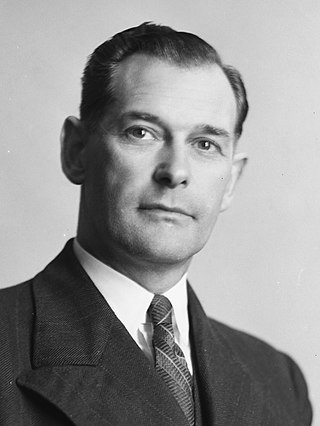
The 1960 New Zealand general election was a nationwide vote to determine the shape of the New Zealand Parliament's 33rd term. It saw the governing Labour Party defeated by the National Party, putting an end to the short second Labour government.
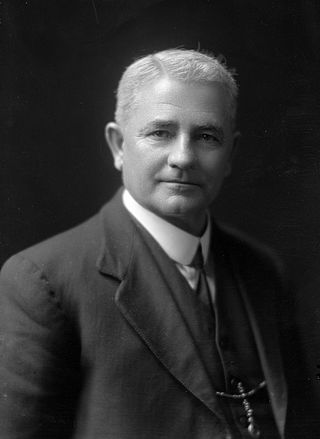
Henry Edmund Holland was an Australian-born newspaper owner, politician and unionist who relocated to New Zealand. He was the second leader of the New Zealand Labour Party.

The 1919 New Zealand general election was held on Tuesday, 16 December in the Māori electorates and on Wednesday, 17 December in the general electorates to elect a total of 80 MPs to the 20th session of the New Zealand Parliament. A total number of 560,673 (80.5%) voters turned out to vote.

The 19th New Zealand Parliament was a term of the New Zealand Parliament. It opened on 24 June 1915, following the 1914 election. It was dissolved on 27 November 1919 in preparation for 1919 election.
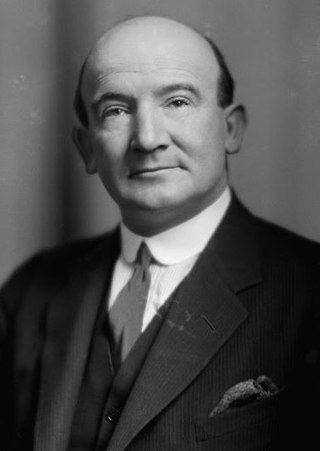
Patrick Charles Webb was a New Zealand trade unionist and politician.
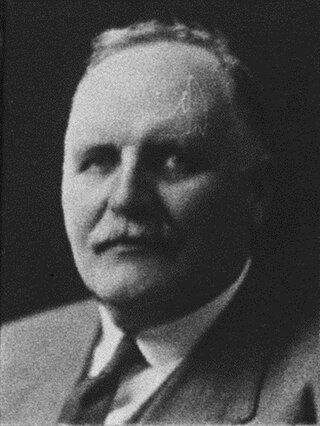
The Tauranga by-election of 1923 was a by-election during the 21st New Zealand Parliament in the Tauranga electorate. The seat became vacant due to the death of the sitting Member, William Herries. The election was held on 28 March 1923 and won by Charles Macmillan, who defeated the former prime minister Joseph Ward.

Mark Anthony Fagan was a New Zealand politician of the Labour Party and a union secretary. He was Speaker of the Legislative Council from 1939 until his death.
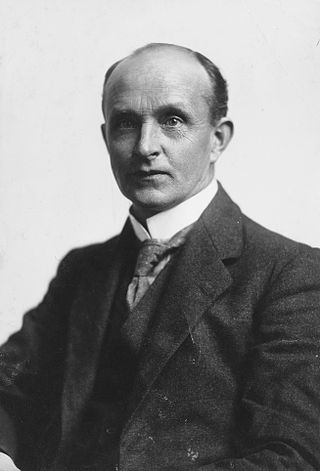
James (Jimmy) McCombs was a New Zealand Member of Parliament for Lyttelton.

Moses Ayrton was a New Zealand Methodist minister and socialist.

The 30th New Zealand Parliament was a term of the New Zealand Parliament. It was elected at the 1951 general election on 1 September of that year.
The New Zealand Labour Party leadership election, 1919 was held on 27 August 1919 to choose the next leader of the New Zealand Labour Party. The election was won by Grey MP Harry Holland.

The Buller by-election of 1933 was a by-election during the 24th New Zealand Parliament in the Buller electorate. It was held on Wednesday 22 November 1933. The seat had become vacant due to the death of Labour party leader Harry Holland who was also the leader of the opposition. Two candidates contested the seat, and it was won by Labour's Paddy Webb, who defeated Liberal-Labour candidate H. Ian Simson from Hawke's Bay.
The Wellington North by-election of 1918 was a by-election held in the Wellington North electorate during the 19th New Zealand Parliament, on 12 February 1918. It was caused by the resignation of incumbent MP Alexander Herdman of the Reform Party, who was appointed as a judge of the Supreme Court, and was won by John Luke with a majority of 420.
The 1923 New Zealand Labour Party leadership election was held in February 1923 to determine the future leadership of the New Zealand Labour Party. The election was won by Buller MP Harry Holland, once again retaining office.
















